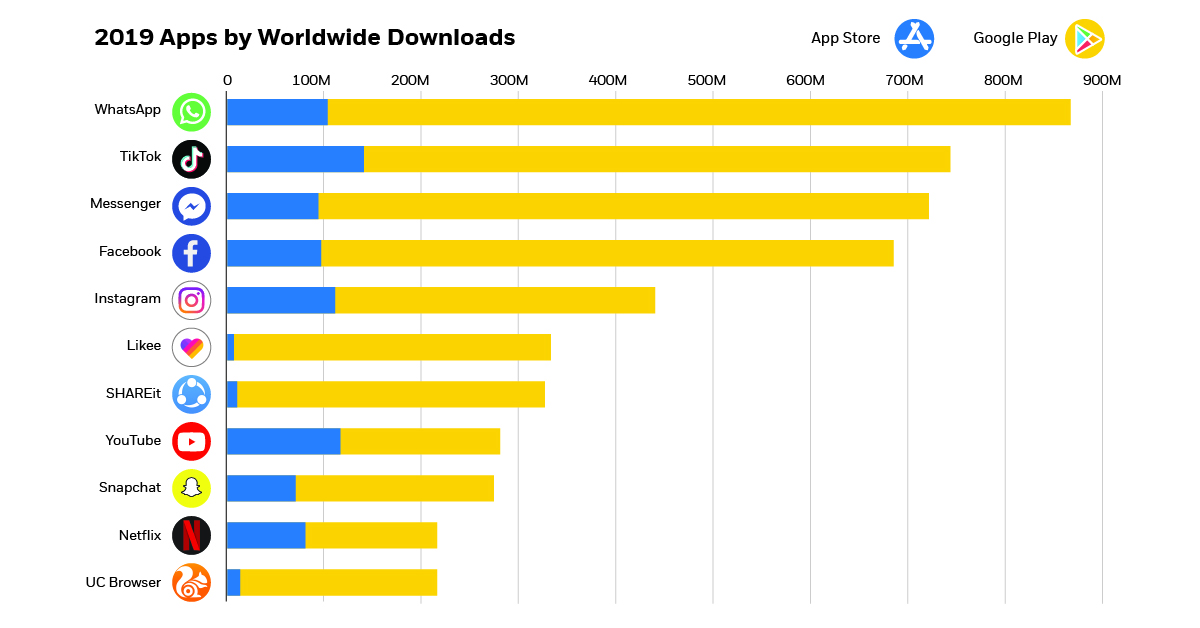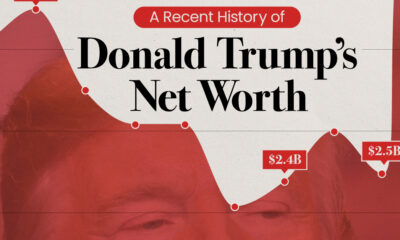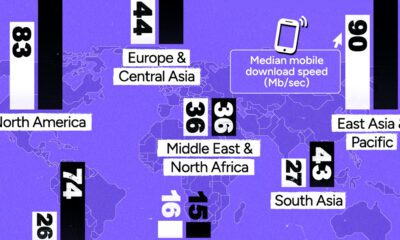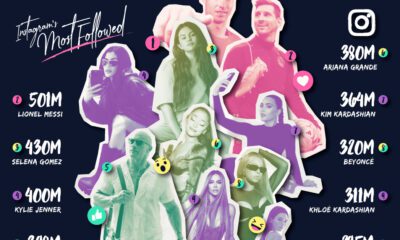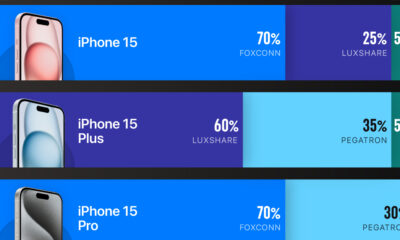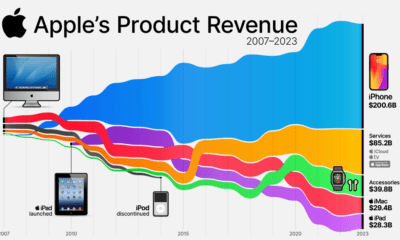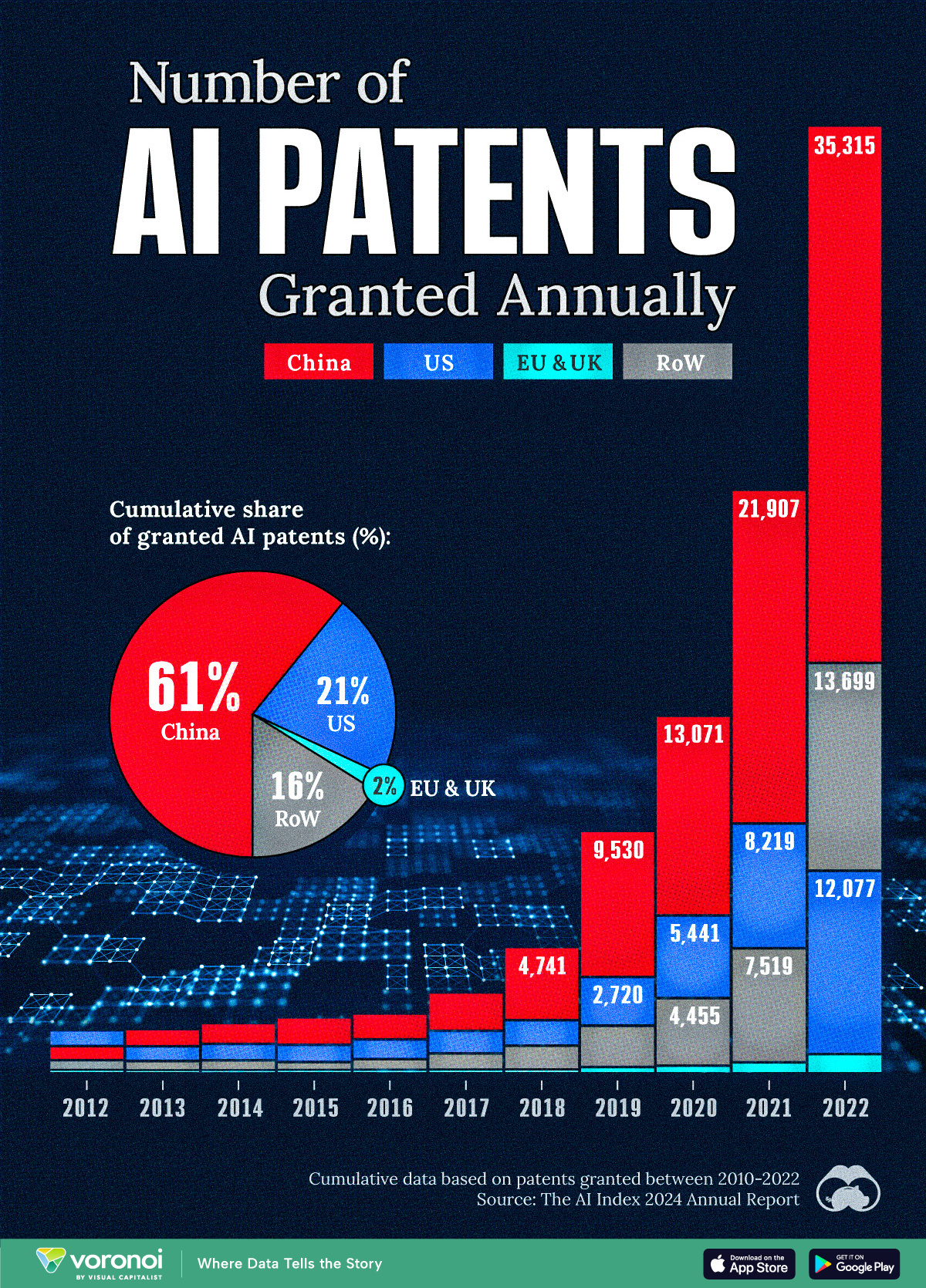Technology
Ranked: The World’s Most Downloaded Apps
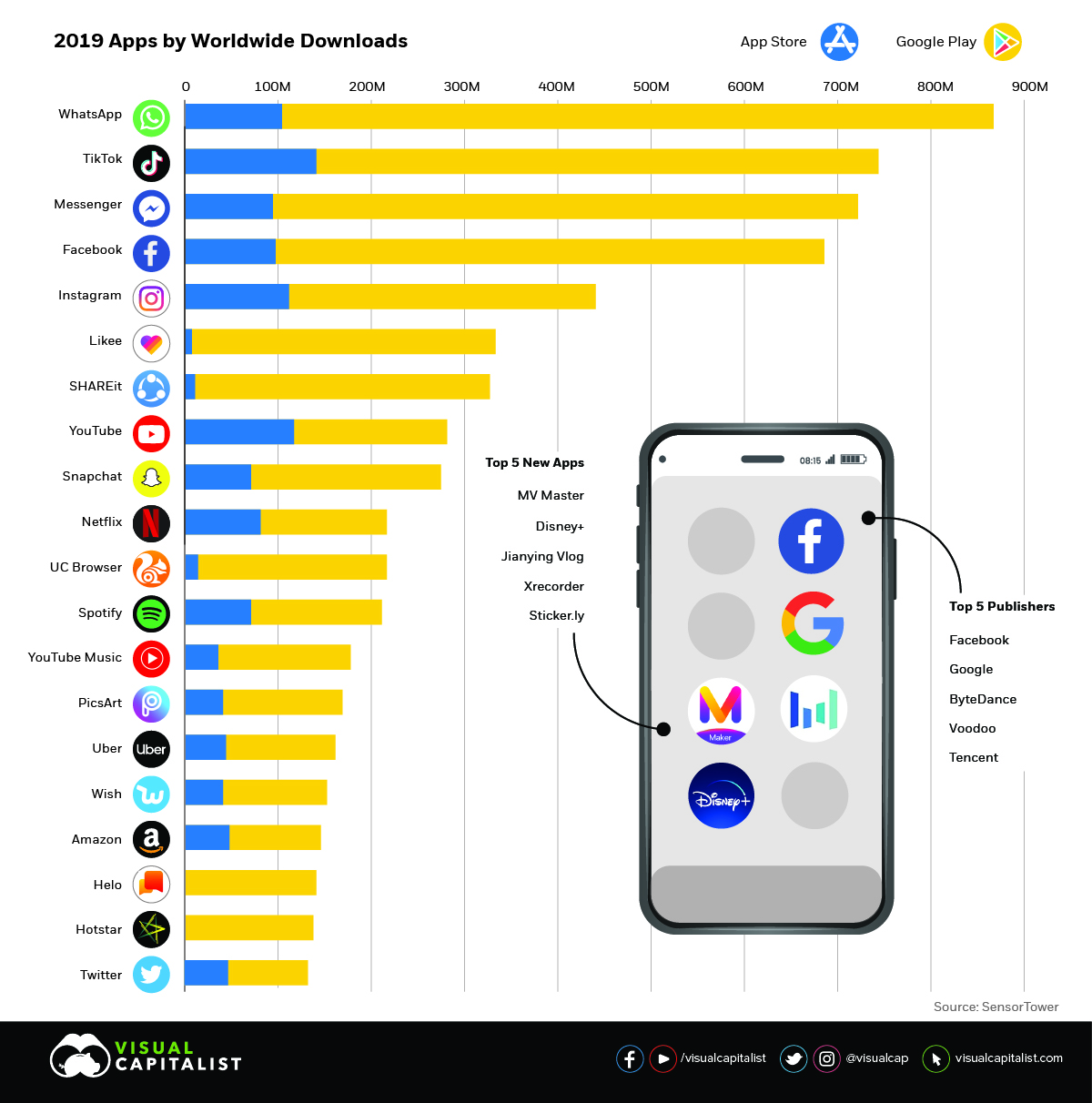
Note: Estimates include unique installs on iPhone, iPad, and Google Play from Jan. 1 through Dec. 31, 2019. Pre-installed apps for Apple and Google are excluded.
Ranked: The World’s Most Downloaded Apps
From strategically finding love, to helping researchers search for extraterrestrial life—there is quite literally an app for almost anything these days.
It is therefore no surprise that apps have become one of the largest consumer ecosystems on the planet, with the global app economy expected to reach $6.3 trillion by 2021.
Today’s graphics pull data from a recent report by Sensor Tower that ranks the top 20 most downloaded apps of 2019. New entrants are rising up and threatening the dominance of more established tech companies—but can they sustain their current position on the leaderboard?
The Champions of the App Economy
According to the report, total app downloads grew to 115 billion in 2019, including almost 31 billion downloads on the App Store and 84 billion on Google Play.
Social media giant Facebook owns four out of five of 2019’s most downloaded apps: Facebook, Facebook Messenger, WhatsApp, and Instagram. Collectively, they boast an eye-watering 16 billion downloads—with WhatsApp holding the top spot for the fourth year running.
Growth in the short-form video category is apparent. The video creation app Likee joined this year’s ranking and sits in sixth place, with the majority of the app’s 330 million downloads coming from India.
The app lets users edit videos using a wide variety of effects, and directly competes with TikTok—a lip syncing app that entered the ranking in 2018 and now threatens WhatsApp’s position at the top of the leaderboard.
Which Apps Are Climbing the Ranks?
TikTok is the newest platform to turn its users into viral sensations, grossing $177 million in 2019. This is equal to more than five times its 2018 revenue. TikTok also bypassed Instagram in 2018, breaking Facebook’s foothold on the top four apps globally.
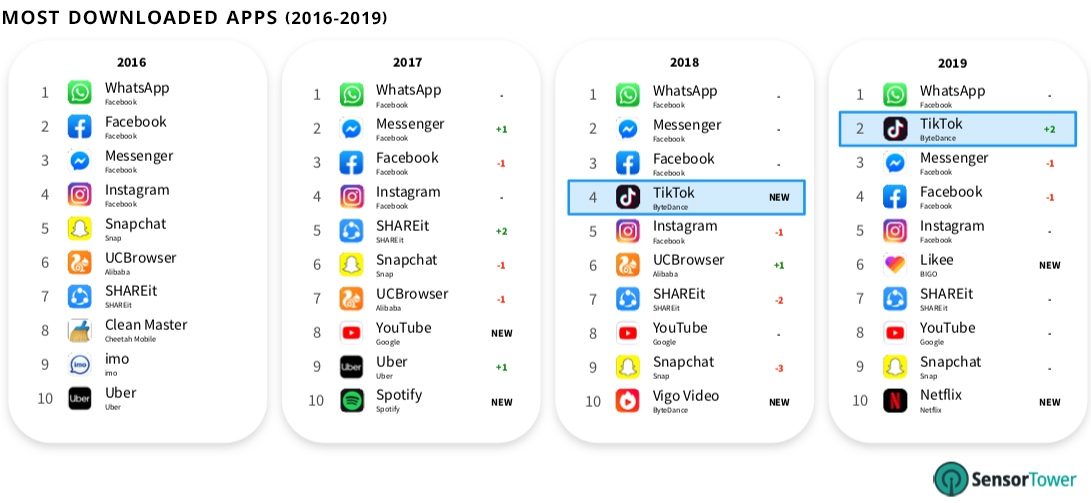
TikTok is owned by Chinese tech firm ByteDance, the most valuable private company in the world—and 78% of TikTok’s total Q4’2019 revenue came from its native country.
Aside from several short-form video entrants, new players from other industries continue to storm up the ranks. While they don’t make the list of most downloaded apps yet, their recent success could change that.
Streaming Services
Netflix is the only streaming service to make it into the top 20 most downloaded apps, but the launch of Disney+ could potentially change that.
Despite a November launch, Disney+ became the second most popular new app of 2019. Within a month, the service generated $50 million in revenue.
To put this into context, Disney+ acquired 34% of all streaming app downloads in less than three months, or 30 million subscribers—half of Netflix’s current 60 million U.S. subscribers. That figure also surpasses Hulu and Amazon Prime’s figures for the entirety of 2019.
Gaming
With 2.4 billion people playing mobile games in 2019, gaming is also set to become a major player in the app economy.
Two popular console franchises, Call of Duty and Mario Kart, recently entered the mobile market to become two of the most successful games in the category.
The free mobile version of Call of Duty had the second best quarter of any mobile game ever, with 170 million worldwide downloads. Only Pokémon GO had a better quarter, with more than 300 million installs when it launched in 2016.
The success of these apps can be attributed to their already established consumer base, and the evident shift in more gamers moving to mobile platforms as smartphone technology and processing speeds improve.
Countries Leading the App Economy
The app economy is also being fueled by growth in emerging markets including China, India, Brazil and Russia, thanks to faster internet speeds and increasing smartphone adoption rates.
Specifically, India’s increasing digitization is driving significant growth in the market. The country witnessed nearly 5 billion app installs in the last quarter of 2019—surging ahead of the U.S. with just over 3 billion installs.
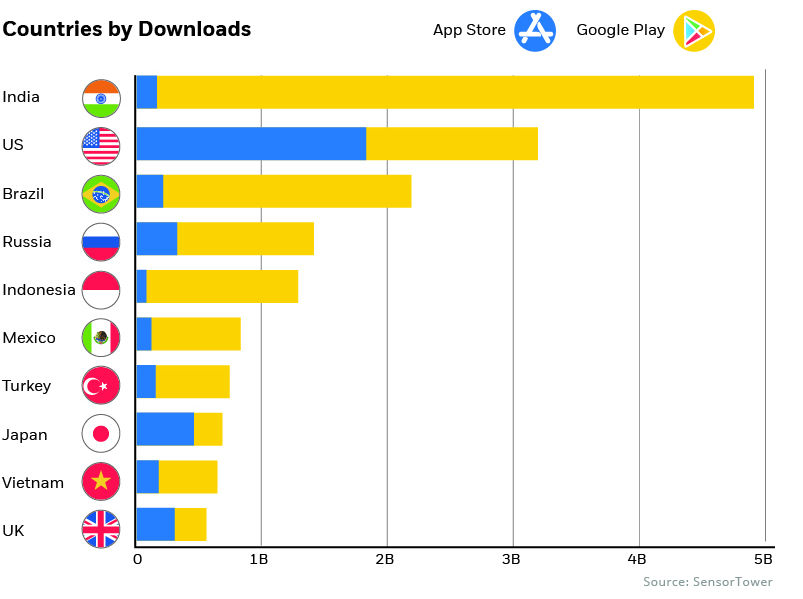
Note: As Google Play is not available in China, the country was excluded from this chart.
India’s demand could be attributed to the fact that half of its 1.3 billion population is under the age of 25. A younger, tech savvy audience has resulted in India becoming TikTok’s top market, commanding 45% of the app’s first time downloads in 2019.
The App Economy 2.0
With an explosion in user spending, and seemingly endless opportunities for innovation, the global app economy shows a tremendous amount of promise, but is still in its early days.
Consumers spent $101 billion on apps globally in 2018. This is double the size of the global sneaker market, and nearly three times the size of the oral care industry.
—Danielle Levitas, EVP of Global Marketing & Market Insights at App Annie
Rising consumer spend combined with other forms of monetization, such as advertising and mobile commerce, could soon enable the app market to surpass the trillion dollar barrier in revenue.
While many experts claimed that the app industry was dead in its tracks, it’s safe to say that those predictions are now being irrefutably challenged.
Technology
Visualizing AI Patents by Country
See which countries have been granted the most AI patents each year, from 2012 to 2022.
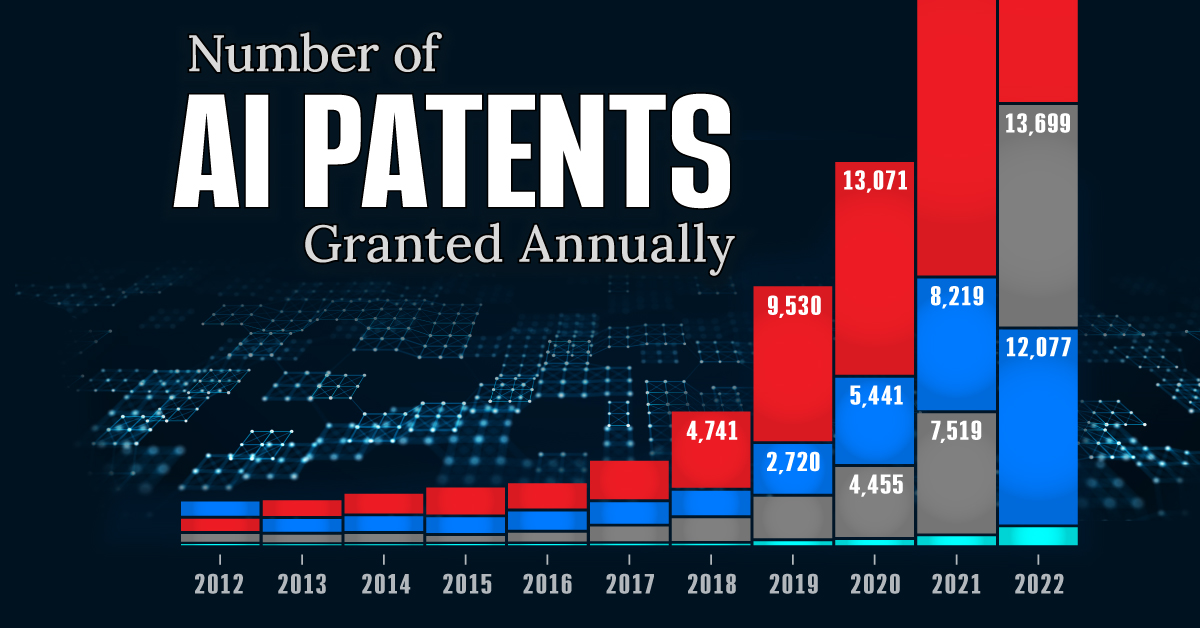
Visualizing AI Patents by Country
This was originally posted on our Voronoi app. Download the app for free on iOS or Android and discover incredible data-driven charts from a variety of trusted sources.
This infographic shows the number of AI-related patents granted each year from 2010 to 2022 (latest data available). These figures come from the Center for Security and Emerging Technology (CSET), accessed via Stanford University’s 2024 AI Index Report.
From this data, we can see that China first overtook the U.S. in 2013. Since then, the country has seen enormous growth in the number of AI patents granted each year.
| Year | China | EU and UK | U.S. | RoW | Global Total |
|---|---|---|---|---|---|
| 2010 | 307 | 137 | 984 | 571 | 1,999 |
| 2011 | 516 | 129 | 980 | 581 | 2,206 |
| 2012 | 926 | 112 | 950 | 660 | 2,648 |
| 2013 | 1,035 | 91 | 970 | 627 | 2,723 |
| 2014 | 1,278 | 97 | 1,078 | 667 | 3,120 |
| 2015 | 1,721 | 110 | 1,135 | 539 | 3,505 |
| 2016 | 1,621 | 128 | 1,298 | 714 | 3,761 |
| 2017 | 2,428 | 144 | 1,489 | 1,075 | 5,136 |
| 2018 | 4,741 | 155 | 1,674 | 1,574 | 8,144 |
| 2019 | 9,530 | 322 | 3,211 | 2,720 | 15,783 |
| 2020 | 13,071 | 406 | 5,441 | 4,455 | 23,373 |
| 2021 | 21,907 | 623 | 8,219 | 7,519 | 38,268 |
| 2022 | 35,315 | 1,173 | 12,077 | 13,699 | 62,264 |
In 2022, China was granted more patents than every other country combined.
While this suggests that the country is very active in researching the field of artificial intelligence, it doesn’t necessarily mean that China is the farthest in terms of capability.
Key Facts About AI Patents
According to CSET, AI patents relate to mathematical relationships and algorithms, which are considered abstract ideas under patent law. They can also have different meaning, depending on where they are filed.
In the U.S., AI patenting is concentrated amongst large companies including IBM, Microsoft, and Google. On the other hand, AI patenting in China is more distributed across government organizations, universities, and tech firms (e.g. Tencent).
In terms of focus area, China’s patents are typically related to computer vision, a field of AI that enables computers and systems to interpret visual data and inputs. Meanwhile America’s efforts are more evenly distributed across research fields.
Learn More About AI From Visual Capitalist
If you want to see more data visualizations on artificial intelligence, check out this graphic that shows which job departments will be impacted by AI the most.
-
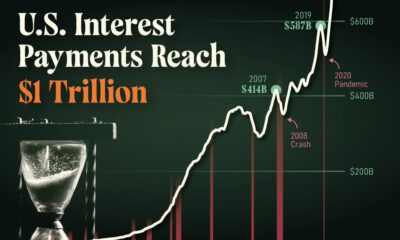
 Markets1 week ago
Markets1 week agoU.S. Debt Interest Payments Reach $1 Trillion
-

 Business2 weeks ago
Business2 weeks agoCharted: Big Four Market Share by S&P 500 Audits
-

 Real Estate2 weeks ago
Real Estate2 weeks agoRanked: The Most Valuable Housing Markets in America
-

 Money2 weeks ago
Money2 weeks agoWhich States Have the Highest Minimum Wage in America?
-

 AI2 weeks ago
AI2 weeks agoRanked: Semiconductor Companies by Industry Revenue Share
-

 Markets2 weeks ago
Markets2 weeks agoRanked: The World’s Top Flight Routes, by Revenue
-

 Demographics2 weeks ago
Demographics2 weeks agoPopulation Projections: The World’s 6 Largest Countries in 2075
-

 Markets2 weeks ago
Markets2 weeks agoThe Top 10 States by Real GDP Growth in 2023

